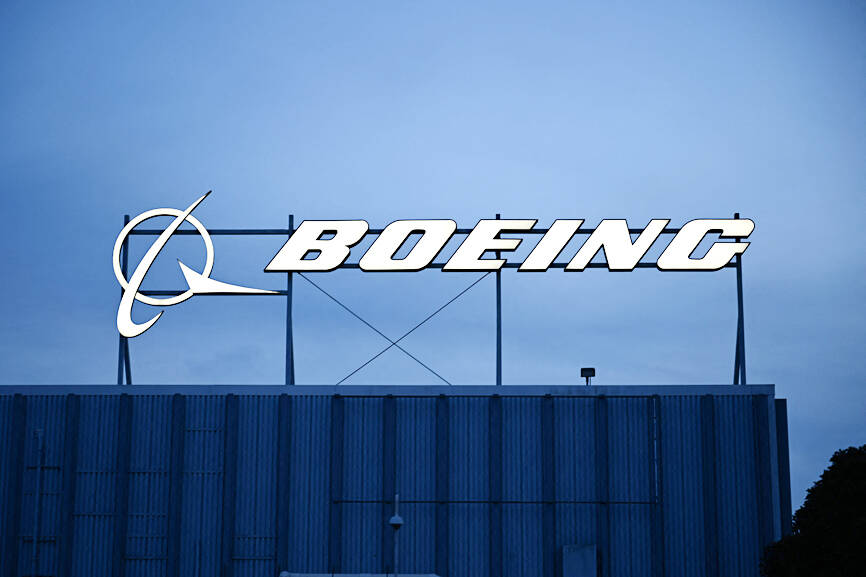Boeing Co has delivered layoff notices to more than 400 members of its professional aerospace labor union, part of thousands of cuts planned as the company struggles to recover from financial and regulatory trouble as well as an eight-week strike by its machinists’ union.
The pink slips went out last week to members of the Society of Professional Engineering Employees in Aerospace (SPEEA), the Seattle Times reported.
The workers would remain on the payroll through mid-January.

Photo: AFP
Boeing announced last month that it planned to cut 10 percent of its workforce, about 17,000 jobs, in the coming months.
Boeing chief executive officer Kelly Ortberg told employees the company must “reset its workforce levels to align with our financial reality.”
The SPEEA said the cuts had affected 438 members. The union’s local chapter has 17,000 Boeing employees who are largely based in Washington, with some in Oregon, California and Utah.
Of those 438 workers, 218 are members of SPEEA’s professional unit, which includes engineers and scientists.
The rest are members of the technical unit, which includes analysts, planners, technicians and skilled tradespeople.
Eligible employees would receive career transition services and subsidized health care benefits for up to three months.
Workers would also receive severance, typically about one week of pay for every year of service.
Boeing’s unionized machinists began returning to work earlier this month following the strike.
The strike strained Boeing’s finances.
However, Ortberg said on a conference call with analysts last month that it did not cause the layoffs, which he described as a result of overstaffing.
Boeing, based in Arlington, Virginia, has been in financial and regulatory trouble since a panel blew off the fuselage of an Alaska Airlines 737 MAX plane in January.
Production rates slowed to a crawl, and the US Federal Aviation Administration capped production of the 737 MAX at 38 planes per month, a threshold Boeing has yet to reach.

When an apartment comes up for rent in Germany’s big cities, hundreds of prospective tenants often queue down the street to view it, but the acute shortage of affordable housing is getting scant attention ahead of today’s snap general election. “Housing is one of the main problems for people, but nobody talks about it, nobody takes it seriously,” said Andreas Ibel, president of Build Europe, an association representing housing developers. Migration and the sluggish economy top the list of voters’ concerns, but analysts say housing policy fails to break through as returns on investment take time to register, making the

‘SILVER LINING’: Although the news caused TSMC to fall on the local market, an analyst said that as tariffs are not set to go into effect until April, there is still time for negotiations US President Donald Trump on Tuesday said that he would likely impose tariffs on semiconductor, automobile and pharmaceutical imports of about 25 percent, with an announcement coming as soon as April 2 in a move that would represent a dramatic widening of the US leader’s trade war. “I probably will tell you that on April 2, but it’ll be in the neighborhood of 25 percent,” Trump told reporters at his Mar-a-Lago club when asked about his plan for auto tariffs. Asked about similar levies on pharmaceutical drugs and semiconductors, the president said that “it’ll be 25 percent and higher, and it’ll

CHIP BOOM: Revenue for the semiconductor industry is set to reach US$1 trillion by 2032, opening up opportunities for the chip pacakging and testing company, it said ASE Technology Holding Co (日月光投控), the world’s largest provider of outsourced semiconductor assembly and test (OSAT) services, yesterday launched a new advanced manufacturing facility in Penang, Malaysia, aiming to meet growing demand for emerging technologies such as generative artificial intelligence (AI) applications. The US$300 million facility is a critical step in expanding ASE’s global footprint, offering an alternative for customers from the US, Europe, Japan, South Korea and China to assemble and test chips outside of Taiwan amid efforts to diversify supply chains. The plant, the company’s fifth in Malaysia, is part of a strategic expansion plan that would more than triple

Taiwanese artificial intelligence (AI) server makers are expected to make major investments in Texas in May after US President Donald Trump’s first 100 days in office and amid his rising tariff threats, Taiwan Electrical and Electronic Manufacturers’ Association (TEEMA, 台灣電子電機公會) chairman Richard Lee (李詩欽) said yesterday. The association led a delegation of seven AI server manufacturers to Washington, as well as the US states of California, Texas and New Mexico, to discuss land and tax issues, as Taiwanese firms speed up their production plans in the US with many of them seeing Texas as their top option for investment, Lee said. The